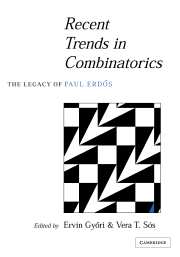Book contents
- Frontmatter
- Contents
- Preface
- Paul Erdős: The Man and the Mathematician (1913–1996)
- 1 A Selection of Problems and Results in Combinatorics
- 2 Combinatorial Nullstellensatz
- 3 Connectedness, Classes and Cycle Index
- 4 A Tutte Polynomial for Coloured Graphs
- 5 Notes on Sum-Free and Related Sets
- 6 Geometrical Bijections in Discrete Lattices
- 7 On Random Intersection Graphs: The Subgraph Problem
- 8 The Blow-up Lemma
- 9 The Homomorphism Structure of Classes of Graphs
- 10 Problem Collection of the DIMANET Mátraháza Workshop, 22–28 October 1995
Paul Erdős: The Man and the Mathematician (1913–1996)
Published online by Cambridge University Press: 03 February 2010
- Frontmatter
- Contents
- Preface
- Paul Erdős: The Man and the Mathematician (1913–1996)
- 1 A Selection of Problems and Results in Combinatorics
- 2 Combinatorial Nullstellensatz
- 3 Connectedness, Classes and Cycle Index
- 4 A Tutte Polynomial for Coloured Graphs
- 5 Notes on Sum-Free and Related Sets
- 6 Geometrical Bijections in Discrete Lattices
- 7 On Random Intersection Graphs: The Subgraph Problem
- 8 The Blow-up Lemma
- 9 The Homomorphism Structure of Classes of Graphs
- 10 Problem Collection of the DIMANET Mátraháza Workshop, 22–28 October 1995
Summary
Preface
Paul Erdős was one of the greatest mathematical figures of the twentieth century. An enormous number of obituaries have appeared since his death, which is very unusual in the world of science.
Paul Erdős had already become a legend in his own lifetime. With a strong character, a clear moral compass and an incredible love of mathematics he created a new mould for a life style. (Will anyone else ever fit it?) This did not require him to pay attention to some of the details of living that most of us deal with. Thus it is not surprising that he developed the eccentricities which are often related by people who knew him and in articles about him – sometimes accurate and sometimes exaggerated. Some of these stories he did not care for, but others he liked to remember, and would retell himself, contributing to the canonization of these anecdotes. As with other passionate geniuses, stories about his eccentricities are a way for writers to show how unusual he was. However, to those who knew him closely, these stories, although amusing, do not in themselves capture the essence of this person, who was so very connected to the world.
Here we shall try to depict Erdős as we saw him.
Mátraháza, 1995
This volume is the Proceedings of the Mátraháza Workshop, one of those workshops which he liked so much, where he felt at home, where he was surrounded by old friends and young mathematicians, all eager to speak with him, to ask him questions, to tell him their results.
- Type
- Chapter
- Information
- Recent Trends in CombinatoricsThe Legacy of Paul Erdős, pp. ix - xxPublisher: Cambridge University PressPrint publication year: 2001

